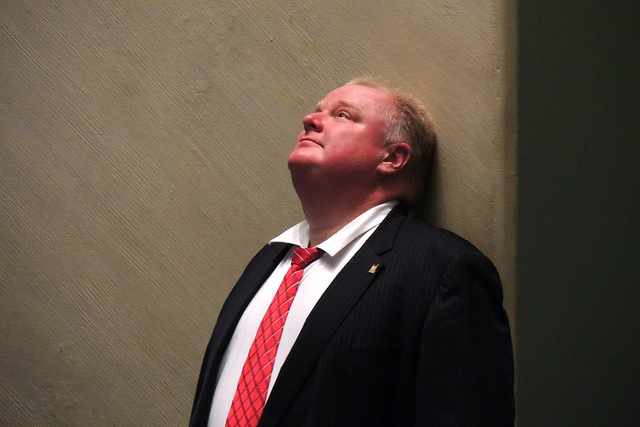Whitewashing Rob Ford: How we Helped Build a Folk Hero

Photo by Greg Stacey, the Torontoist.
Back in 2013, I wrote that we “might be laughing a little too hard” at Rob Ford — not for moral reasons, but because I felt that backlash to all of the negative attention might lead to him being regarded as a martyr/folk hero by a considerable portion of the population.
Today, the death of Ford will be the top story for news outlets around the world. The racism, the misogyny, the contempt for so many members of our society, the ties to violence (and perhaps even murder) will be airbrushed for the time being. We’ll hear terms such as “maverick” and “real guy” — and be reminded that he was a populist revolutionary.
Similar to my point in 2013, we’ll run the risk of elevating him to the level of martyr and/or folk hero.
When I saw the Tweet that Rob Ford had died, I felt that sucker-punch loss of breath that occurs when someone close to you dies.
Truth is, I didn’t know Rob Ford. I probably wouldn’t want to know Rob Ford. But he sure took up a lot of space in my mind. Enough that I physically felt his death. That’s how much the media – and social media — made him a part of our lives.
Of which I am implicitly guilty.
I was called upon a few times to comment on the behaviour of Rob Ford — and I did so on TV and in print. I did so on my own social media. I tried — not always successfully — to keep my commentary to the dangers he represented to the political process and to the fact that his behaviour made him unsuitable for leadership. I’m not ashamed to admit that I often slipped. Ford’s antics made it far too easy to make jokes.
http://www.youtube.com/watch?v=s-9irvj7tOQ&t=5m3s
Here’s the thing though: Ford’s cartoonish personality invited us to poke fun. His behaviour was almost too out there to seem real. Similarly, it will be just as easy, for many, to place him on some kind of pedestal in the hours and days after his death. Once again, the cartoon outlandishness will hide the truly scary. As the obits come in — and they’ve been pre-written ages ago — we’re already witnessing this.
And this, too, is wrong.
Rob Ford left behind too many victims for this to be allowed. There were the firsthand sufferers — the ones who personally felt his legacy of physical and verbal abuse — and then there are many others whose cultures, social status, and ways of life were belittled and maligned. In short: by whitewashing Ford’s past, we do great injustice to the victims and the disempowered.
So, how do we respond to death of a major public/political figure that was unapologetically racist, sexist, homophobic — one that did not fear violence as a solution to situations?
How does the media?
It’s a tough question. and one that I don’t know that I have an answer to. But this I feel for certain: you can’t sweep the dangerous elements under the rug.
They don’t get buried with the body.
And — in celebrating his fame — you cannot ignore that for which he was most famous/infamous.
Me? I’m going to take a moment to ponder what it is that caused Ford to evoke such powerful feelings and responses from so many people. How it was that he was equally capable of raising anger, ridicule, and respect.
I’m also going to ponder how it is that I felt compelled to help make a folk hero out of a very dangerous man.
God speed, Mr. Ford. I don’t wish ill on anyone in death.
May we learn something about ourselves from your difficult time among us.
